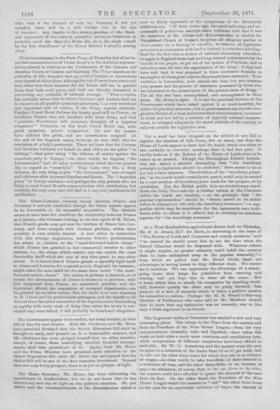The Alsace-Lorraine customs treaty between France and Germany is not
yet concluded, though the latest reports appear to be favourable to its successful negotiation. The obstacle seems to have been the condition for reciprocity between France and Alsace,—the Germans fearing, in the true spirit of M. Driers, that French goods may get over the borders of Alsace into Ger- many, and there compete with German produce, unless their quantity is very strictly limited. A new alarm iu connection with this strange negotiation between frantic protectionists has arisen in relation to the "most-favoured-nation clause" which France has granted in her commercial treaties to other nations, i.e., the clause which assures any one nation the most favourable tariff which she may at any time grant to any other nation. It is feared that if France grants ,a specially light tariff to Alsace and Lorraine for a special period, England, for instance, might claim the same tariff for the same term under " the most- favoured-nation clause." The notion is perhaps a delusion, as of course the circumstances of Alsace-Lorraine as a province only just conquered from France are somewhat peculiar, and the equivalent offered, the evacuation of occupied departments, can be granted by no other nation. But the doubt is so very alarming to M. Thiers and his protectionist colleagues, and the benefit to be derived from the earlier evacuation of the departments is diminishing so rapidly with every week of delay, that unless the treaty is con- cluded very soon indeed, it will probably be abandoned altogether.






























 Previous page
Previous page